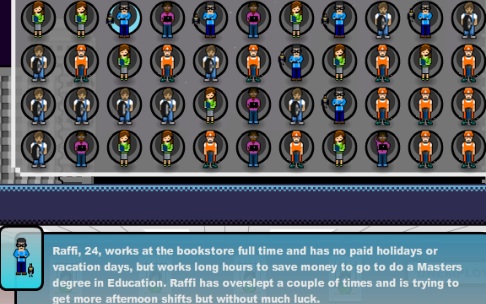Lay it on, Layoff
I just spent most of my morning playing and marvelling over Tiltfactor Laboratory’s new browser game Layoff. Co-developed by Tiltfactor and the Rochester Institute of Technology Game Design and Development program, Layoff is a smart and smarmy commentary on “the current state of the US financial crisis,” in which the player helps restructure yet another faceless corporation’s hapless workforce.
The gameplay is a variation on Bejeweled, wherein the player targets entire classes of workers for layoffs by lining them up in multiples of at least three; once three or more workers of the same class are arranged in a row, they are sent tumbling to the bottom of the screen, where they are instantly queued to collect unemployment.

Unlike the jewel-encrusted browsergames that partially inspired its game mechanics, there is no leveling in Layoff or warm-fuzzies awarded for clearing the grid. A tally is kept in the top right screen, showing the player how much money she has saved the company by gangplanking the workers onto the public dole. If the player matches five workers of the same class, a corporate merger ensues and a banker icon is added to the grid; bankers cannot be selected or grouped for removal in the same way that the other classes can, and are only alleviated by the “BANK BAILOUT” button underneath the player’s tally of “$ SAVED”.
What I find most satisfying about Layoff, of course, is its underlying argument. Hovering the mouse over any worker on the grid gives the player a short character sketch of that specific sprite’s personal history or situation. Mini-bios for the workers are poignant and sobering, revealing the hardships, worries, and strife that are becoming all too commonplace in our New Depression.

A different poignance is found in the bankers’ pop-ups, whose text frequently parrots the corporate-speak commensurate with the talking heads on CNBC or FOXBusiness. In my most recent game session, I laid off an entire row of orange-shirted workers and was immediately rewarded by the banker who took their place shamelessly proclaiming:

The gameplay is confined to the top half of the browser window, but it is probably the bottom half that is most compelling. This is where the text pop-ups appear, also where all the displaced workers pace back and forth as they wait to collect their unemployment checks, and still also where a CNN/FOXNews-style ticker displays factoids from the real world of corporate mergers and the collapse of the U.S. banking system. The total effect of this space is a powerlessness for the player that is rare to find in most games, because most games are trying desperately to distract us from these kind of issues. In other words, Layoff is by design all about the proverbial bottom line, and it does not hesitate to point fingers.
For Tiltfactor, Layoff’s competence as both a game and an argument draw immediate comparisons to the rhetorical/persuasive works of Ian Bogost, Gonzalo Frasca and Paolo Pedercini. This is not only high praise in my opinion, but praise well-earned.